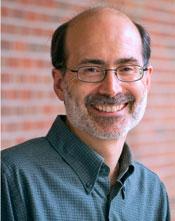Hageman Distinguished Lecturer in Agricultural Biochemistry

Dr. Richard AmasinoDepartment of Biochemistry November 3-4, 2010Lecture: "Memories of winter: vernalization is an environmentally induced epigenetic switch" Colloquium: “Biochemistry teaching and earth history" |
About the speaker
Richard M. Amasino grew up just east of Pittsburgh, PA and memory of winter there remained with him throughout his years as a student (Penn State for B.S., and Indiana for M.S. and Ph.D.) and as a post-doctoral fellow at the University of Washington, Seattle. Of course as a Professor at the University of Wisconsin, for the past 25 years, he gets to experience a real winter each year, so that the memory is renewed annually.
For his Ph.D. dissertation, Professor Amasino worked with Carlos Miller, who with Folke Skoog at Wisconsin, identified cytokinins in plants. Amasino examined how hormonal balance determines shoot differentiation vs disorganized callus growth. As a post-doctoral fellow in Seattle he worked with our first Hageman lecturer, Eugene Nester. There he investigated integration of genes from the Ti plasmid of Agrobacterium, and showed that they encode production of plant growth hormones. He also observed the impact of DNA methylation on Ti gene expression.
Professor Amasino's research at Wisconsin has dealt with the importance of DNA and histone methylation, in a variety of contexts, during the plant life cycle, particularly in the model plant, Arabidopsis.thaliana. Plant DNA is heavily methylated, and methylation serves in many long-lasting epigenetic responses. Along the way he studied both the TIC and the TOC of the circadian clock, and recently has focused on how plants can maintain, or lose, their memory of winter. That epigenetic memory will be the topic of this year's Hageman lecture.
Among his services to the scientific community, Professor Amasino has served on numerous review panels, and on editorial boards of Plant Journal; Plant Physiology; Plant, Cell and Environment; and Science. During 2006-2007 he was president of the American Society of Plant Biology. His honors include a McKnight Foundation award, Presidential Young Investigator Award, Alexander von Humboldt Award and, in 2006, election to the National Academy of Sciences.
Professor Amasino is also a Howard Hughes Medical Institute Professor, since 2006. Part of his effort in that capacity is to develop rapid-cycling brassicas as a genetic model system for use in undergraduate education. Undergraduate students are to be involved in generation of mutants, and development of the system. The brassicas are close relatives of Arabidopsis, but are easier for novices to handle.
In addition to his research, advancing science education, and general science knowledge, is an interest of Professor Amasino. The colloquium this year explores the observation that "recent advances in cosmology and geobiology provide opportunities to stimulate interest in and broaden our student's understanding of, traditional biochemical topics such as respiration and photosynthesis." For instance Albert Szent-Györgyi remarked that "life is nothing but an electron looking for a place to rest", and a number of authors have suggested that "hydrogen is a colorless, odorless gas, which, given enough time, turns into people." These somewhat provocative points open opportunities for discussion, and catch the attention of non-science majors as well as science majors. How things came to be as they are, is a topic for investigation, not merely "just-so stories."